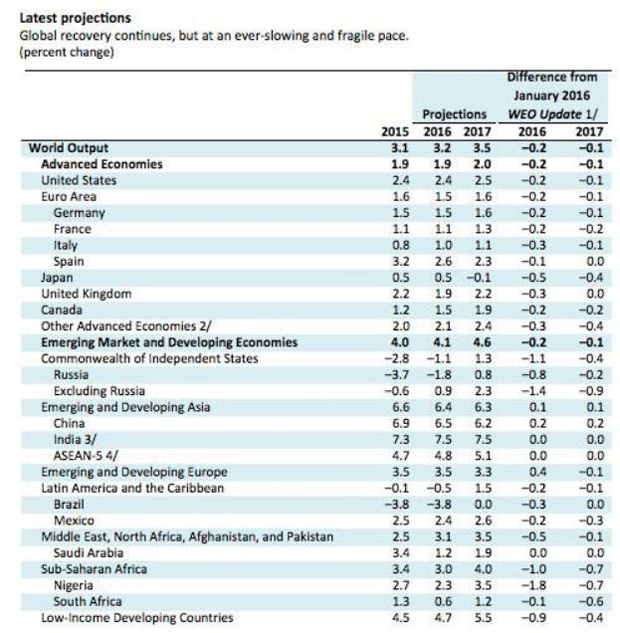IMF: Global economy is losing steam
The global economy is losing speed, raising concerns that the recovery could stall.
For the second time this year, the International Monetary Fund has cut its outlook for 2016 economic growth in the U.S. and other countries around the world, citing China's ongoing slowdown and muted demand. The lender now forecasts annualized global growth of 3.2 percent, down from the 3.4 percent it hadpredicted in January (see chart at bottom).
"Global growth continues, but at an increasingly disappointing pace that leaves the world economy more exposed to negative risks," Maurice Obstfeld, IMF economic counselor and director of research, said Tuesday in a news conference in Washington. "Growth has been too slow for too long."
The lender also warned that, left to fester, the slow recovery from the 2008 financial crisis could heighten social and political turmoil, further impeding growth.
The U.S., while a relative bright spot among major economies around the world, is also sputtering. The IMF pared its forecast for U.S. growth this year to 2.4 percent, from 2.6 percent in January. Propelling that modest expansion, on pace with the same rate of growth in 2015, are solid domestic demand, healthier household finances and diminishing fiscal drags.
But those positive forces are being held back by brittle business confidence and weak investment, along with inadequate countermeasures in many countries. First-quarter corporate profits in the U.S. are expected to be the weakest since 2009.
Private forecasters say U.S. GDP -- the total value of goods and services -- has been exceptionally weak over the first three months of the year. Consensus estimates among Wall Street economists is for the U.S. to expand around 2 percent year year.
IMF Managing Director Christine Lagarde has urged political leaders to implement fiscal, monetary and structural measures to stimulate growth. Obstfeld echoed that message.
"If national policymakers were to clearly recognize the risks they jointly face and act together to prepare for them, the positive effects on global confidence could be substantial," he said.
Specifically, the IMF wants countries to boost spending on roads, bridges and other infrastructure, as well as keep interest rates low to spur borrowing and investment.
Although the IMF expects the global economy to regain momentum 2017, it cites a number of risks that could torpedo growth. These include a sharper-than-expected slowdown in China; a return of financial turmoil in emerging markets; weakening political solidarity in Europe; and a prolonged slump in oil prices, which would worsen the pain for oil-exporting countries.
"Since last summer, we have seen two distinct rounds of global financial turbulence. They featured abrupt sell-offs of risky assets, heightened risk aversion, spikes in emerging-market sovereign spreads, and sharp falls in prices of oil and other commodities," Obstfeld said. "Markets largely recovered both times, but participants have arguably reacted more than changing fundamentals would have warranted, both on the downswing and the upswing. There is a risk that further bouts of volatility feed through to the broader economy."
Terrorism and the exodus of refugees from war-torn regions could also have spillover effects and hinder economic activity, the IMF said.
Global economic activity was also subdued in 2015, with growth in emerging markets falling for a fifth straight year even as a modest recovery continued in advanced countries.
"The IMF has consistently been forced to revise down their overly optimistic forecast for global growth," said Stifel chief economist Lindsey Piegza. "Like many policy officials, as of late, forecasts seemed to be based more on unfounded expectations rather than the clear underlying fundamentals, which consistently show stagnant, lackluster momentum."
Piegza doesn't expect slowing growth overseas to have much of a direct impact on the U.S. But such weakness could make it more difficult for the Federal Reserve to raise interest rates over the next few years if growth and inflation continue to undershoot the central bank's targets.
"Should a further slowdown in China or additional declines in European activity send shockwaves through the market, the Fed will have a hard time raising rate once this year, if at all," she said.
